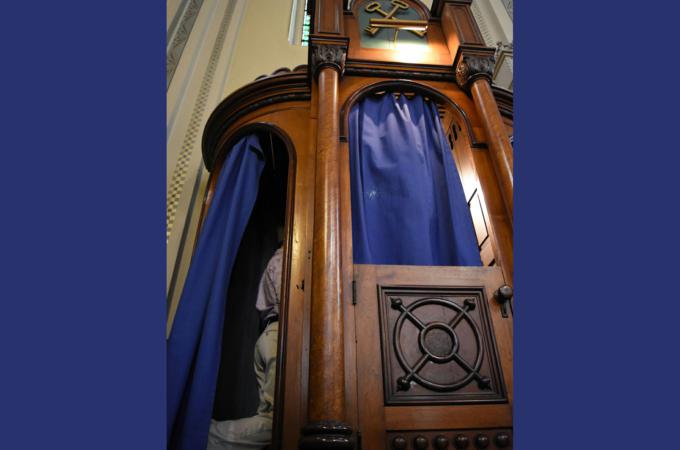At Mass if you're in confessional?
Q. Growing up Catholic, I was taught that in order to fulfill your Sunday obligation, you were required to be present for three parts of the Mass -- the Gospel, the offertory and Communion. Our parish just started hearing confessions at the very time the Sunday Mass is being celebrated (i.e., not just before or after Mass).
So my question is this: If you are in the confessional during any of these three parts of the Mass, have you fulfilled your Sunday obligation? And what about receiving holy Communion? (Coon Rapids, Minnesota)
A. Your memory is two-thirds correct. Half a century ago, Catholics were taught that if you wanted the Mass to "count," you needed to be present for the offertory, the consecration and Communion.
Now, though, the church views the Mass as an integrated whole, a single act of worship from the entrance rite through the dismissal prayers, and canon law simply says, "On Sundays and other holy days of obligation, the faithful are obliged to participate in the Mass" (No. 1247).
If you happen to be in the confessional for part of that time, I would say that you are "morally present" at the Mass (your intent is certainly to be there) and that you are eligible to receive holy Communion.
Your question, though -- about a parish's practice of hearing confessions during Mass -- deserves further comment. That practice is a source of some pastoral debate among priests.
Since the faithful are gathered in largest numbers during Mass times, some view this as the opportune moment to make the sacrament of penance available; others, though, feel that it easily distracts people from the eucharistic liturgy itself.
Strictly speaking, there is no universal prohibition of the practice. In fact, the Vatican has spoken directly to the point: In 2001, the church's Congregation for Divine Worship and the Sacraments, while expressing a clear preference that confessions be heard outside of Mass, specifically allowed that they can be heard while Mass is being celebrated.
Some dioceses, though, have issued their own guidelines: The Archdiocese of Chicago, for example, says in its published sacramental policies that "the sacrament of penance shall not be celebrated while a Mass is being celebrated in the same place."
Q. Yesterday, at the parish church I attended, a visiting monsignor gave the homily. (I believe he did so at all the Masses that day.) At the Mass my daughter went to, this monsignor referred at least three times in his homily to the "feast of Martin Luther King."
Many parishioners were upset, and a few walked out. Is this right? (Georgia)
A. The monsignor misspoke. Feast days are celebrated in the Roman Catholic Church for those who have been formally recognized as saints -- usually after a lengthy and rigorous process of examining their lives and the miracles credited to their intercession.
Martin Luther King Jr. Day is, instead, a national holiday -- proclaimed as such by the U.S. government to honor King's life and work. This year, on the date of the holiday -- Jan. 16, 2017 -- the church's liturgical calendar calls for the celebration of the Mass of "Monday of the second week of ordinary time."
I do think, though, that it's appropriate that King be mentioned in Catholic churches at the time of the holiday.
Some 30 years ago, I served as the Catholic representative on a national committee planning the first King holiday, and I remember Coretta Scott King, Martin's widow, saying at a meeting that she hoped the holiday would be used not so much to honor her deceased husband personally but to advance the cause he cherished.
I always include in the prayer of the faithful on the weekend prior to the holiday a petition that says, "As we recall the life and death of Dr. Martin Luther King Jr., for an end to racism and for continued cooperation among those who stand against discrimination, we pray to the Lord."
As for the people who walked out of your church at the monsignor's misstatement, that strikes me as a bit extreme, and I have to wonder what underlying biases that reaction might indicate.
- - -
Questions may be sent to Father Kenneth Doyle at askfatherdoyle@gmail.com and 30 Columbia Circle Dr. Albany, New York 12203.
- Father Kenneth Doyle is a columnist for Catholic News Service



















